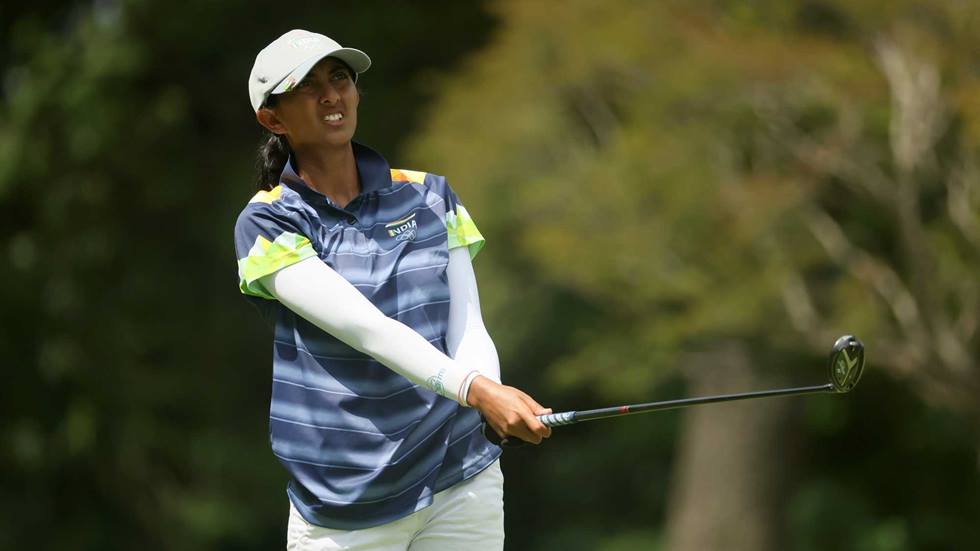New Delhi: They say fourth is the worst place to finish in the Olympics. If last is the most embarrassing, fourth is the most painful. When one endures it by the narrowest of margins, and in a sport like golf, it can’t get any worse.
Aditi Ashok experienced that excruciating pain Saturday, and with it, post-independent India’s tryst with fourth-place heartbreaks at sport’s grandest stage continued, the run beginning way back in 1956.
“You don’t want to join that club,” Aditi said, but joined she did, after missing out on what would have been a landmark medal.
“But I guess I’ve joined it. But no, I think it’s good, just even top 5 or top 10 at an Olympics is really good.”
In golfing parlance it was a case of ‘so near and yet so par’.
A day before, the Indian women’s hockey team went through exactly the same heartbreak, losing 3-4 to Great Britain in the bronze play-off.
With her mother carrying the bag, Aditi was a step away from adding one of the finest chapters to the country’s Olympic history, but eventually ended up joining a list, which includes some of the country’s greatest athletes, that no sportsperson wishes to be part of.
Here is a look at the instances when India came close but ended at just that.
#It all began at the 1956 Games in Melbourne, where the Indian football team made the semifinals after beating hosts Australia 4-2 in the quarterfinals, with Neville D’Souza becoming the first Asian to score a hat-trick at the Games.
By giving his team the lead, Neville looked like doing an encore in the last-four clash against Yugoslavia, who came back strongly in the second half to seal the contest in their favour.
In the bronze medal classification match, India could not recover from the blow they received against Yugoslavia, losing to Bulgaria 0-3, drawing to a close an eventful few days which the great P K Banerjee would often reminisce about.
#Four years later, at the 1960 Games in Rome, another heartbreak awaited India as the legendary Milkha Singh missed out on a bronze by the narrowest of margins.
Competing in the 400 metres final and touted as a medal contender, the ‘Flying Sikh’ fell short by a mere 1/10th of a second after slowing down to see his fellow competitors, an error that he would regret for the rest of his life.
This would go down as his life’s worst memory after his parents were killed in the aftermath of the partition.
Milkha almost gave up the sport after that loss and it required a lot of persuasion for him to hit the track again and win two gold medals in the 1962 Asian Games.
#A little more than four decades before the players of current Indian women’s hockey team endured the agony of narrowly missing out on a medal, their predecessors had gone though a similar experience when they lost their last match to erstwhile USSR 1-3 to finish behind Zimbabwe, Czechoslovakia and the Russians.
With top hockey nations such as the Netherlands, Australia and Great Britain boycotting the 1980 Moscow Games over the USSR’s invasion of Afghanistan, the Indians had a great chance to finish on the podium in their their first attempt itself, but all they could manage was the fourth position.
#The 1984 Olympics in Los Angeles brought back memories of Milkha in Rome when P T Usha missed the 400-metre hurdles bronze by 1/100th of a second, making it the closest-ever miss for an Indian athlete in any competition.
Known as the ‘Payyoli Express’, she ended up fourth behind Romania’s Christina Cojocaru, but her heroic effort left a lasting impression and she became a household name.
The 400-metre hurdles was introduced for the first time in LA, raising hopes of a podium for the fancied Indian.
#After a long gap of 20 years, the curse of the fourth place finish returned to haunt the Indian contingent when the celebrated duo of Leander Paes and Mahesh Bhupathi missed out on the podium at the Athens Games in 2004.
Arguably India’s greatest tennis doubles pair, Paes and Bhupathi missed out on a bronze medal after losing a marathon men’s doubles match to Croatia’s Mario Ancic and Ivan Ljubicic 6-7 6-4 14-16 to end fourth.
Before that, the Indian pair went into semifinals as favourites but lost to the German duo of Nicholas Kiefer and Rainer Schuttler in straight sets 2-6 3-6.
At the same Games, Kunjarani Devi, who had inspired Tokyo Olympics silver-medallist Mirabai Chanu to take up the sport, finished fourth in women’s 48 kg weightlifting competition, but she was not really in medal contention.
Disqualified in her final attempt to lift 112.5 kg in the clean and jerk category, Kunjarani finished with overall 190 points, 10 points behind bronze medallist Aree Wiratthaworn of Thailand.
#At London 2012, shooter Joydeep Karmakar experienced the terrible feeling of finishing a place behind the bronze medal winner.
Karmakar had finished seventh in the qualification round of men’s 50-metre rifle prone event, and in the finals, he ended just 1.9 points behind the bronze medal winner, Rajmond Debevec of Slovenia.
#In 2016, when the Olympics was held in Rio de Janeiro, Dipa Karmakar became the first Indian woman gymnast to compete at the Games. After making the final of the women’s vault event, Karmakar finished fourth overall with a score of 15.066 and missed the bronze medal by 0.150 points.
She introduced the sport to India and gave the message that one doesn’t have to be born in the USA or Russia to become an excellent gymnast.
At the same Games, Abhinav Bindra’s illustrious career was headed for a fairytale finish but a shooter of even his class was not spared of the curse of the fourth place finish, as he missed the bronze medal by a whisker, eight years after his historic gold medal at the Beijing Olympics.
